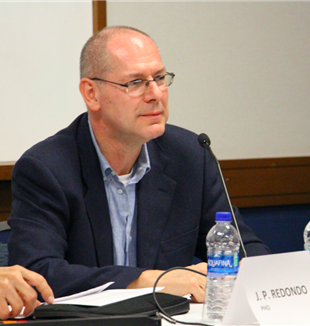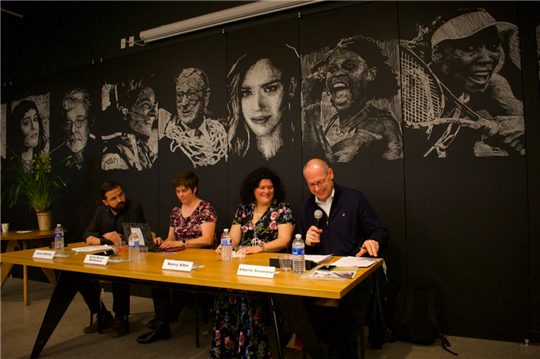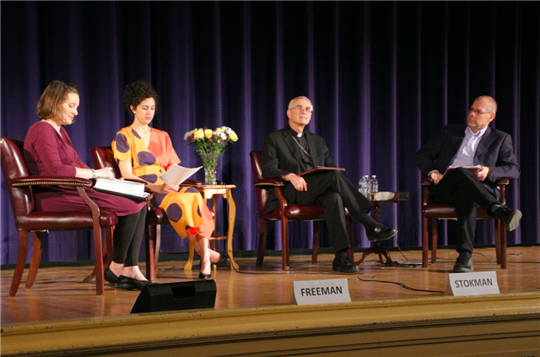
A Change is Gonna Come
The author of Giussani’s biography looks back on his ten stops in the United States and Canada to present the book’s American edition. People describe what the charism has to offer for men and women today as we face an unprecedented crisis.The morning before I left, saying good-bye over the phone, Julián Carrón said to me, “Keep your eyes open! And go in peace.” Because of those words, all my worries on the eve of my departure (10 events in 11 days; a flight to catch every day, jumping between time zones; the language problem) had dissipated by the time I reached my first destination in New York, where Jonathan Fields and Ken Genuard sang “A Change is Gonna Come,” a song written by the king of soul, Sam Cooke, to kick off the event. The title of the song described something that was about to happen through the words of the panelists: Margarita Mooney, an associate professor at Princeton Theological Seminary, described “a reawakening of a person’s desire for truth,” and Anujeet Sareen, a portfolio manager for Brandywine Global mentioned the discovery that “your heart is made for the infinite” and “the wonder and joy at that fact.”
Fourteen years after his death, Giussani has proven to be a trustworthy companion for those Americans “seeking a path forward” (the title given to the book tour). Their encounter with him has involved something new, a breath of fresh air in a place where faith is often lived out as moralism that only knows how to say no, or is conceived of as something to defend in the face of our unprecedented social crises. All of the panelists had encountered the fruits of Giussani’s charism before reading the biography. They all said that what struck them was a fascinating way of living everyday life. They saw a kind of Christianity that was, in some ways, totally unfamiliar, communicated in a “providential way […] for the post-modern man who doesn’t understand himself or reality” (J.D. Flynn, the editor-in-chief of the Catholic News Agency), and which offers itself as a companion for the journey.
Helen Alvaré, a law professor at George Mason University, jokingly revealed the nature of this companionship when she said, “I’ve been traveling the last few months, giving a presentation a week at different universities around the country, and I’ve been forced to carry the book because it’s too big for my briefcase or backpack. But it has provoked many wonderful conversations. You have no idea how many people want to know what possibly can be drawing you to read a book that big and schlep it onto a plane with you.” At the end of one presentation, a woman came up to me and said, “Since I discovered them, the books of Giussani and Carrón are always there on my table; they are my daily companions at work.” She introduced herself and told me that she is a palliative care doctor who works every day with patients who ask to be able to die so they do not have to suffer any more, words that took on great significance.
It was a trip studded with surprises, ones that left me feeling inadequate in the presence of the people I met. I saw the profound weight of such questions as: How do we educate our young people? What is our role in the life of the church? No one I met claimed to have the right answers to these questions. Everyone was looking for a path for the future, full of curiosity. These were Catholics who have not resigned themselves to a diminished faith and are not satisfied with partial answers to these questions just so that they can get by.
Almost all the panelists were struck by the way Fr. Giussani faced the crisis of ’68 without mincing words, always starting with Christ. I had the impression that, in some way, they are living the same things now within the American church and are beginning to realize that Christianity as a tradition or a moral system is no longer capable of moving people.
Speaking in Omaha, Michael Waldstein, professor of New Testament at the Franciscan University of Steubenville, underlined that “if the Catholic Church were supposed to preach morals only, then we would have no ground to stand on–the church would be nonexistent.” For him, Giussani’s big contribution was the fact that “Christ is the only answer to the longing of the human heart.”
In Miami, Rod Dreher, one of the best-known Christian journalists in America, said, “In 1968, Giussani realized that we are at a point in history in which no one will be reasoned into believing in Christianity because of an appeal to tradition; this is because people no longer place a value on tradition. People today will only be converted by what Giussani called an ‘event’; that is, by meeting a ‘presence charged with a message,’ from which all the rest derives.”
This is what had happened to the speakers who encountered the CL communities sprouting up here and there in the US: they saw in them a road, a chance to begin again. Reading Giussani’s books or the biography began to explain what makes a group of friends that awakened their curiosity so different. They discovered a way of living the faith that overcomes any activism in a country where the church has based a good part of its reputation on its influence on society and politics.
John Allen, a well-known Vatican correspondent, admitted during the Denver presentation that, “Years ago, I confessed to Msgr. Lorenzo Albacete that I did not understand Giussani’s books and he said to me, ‘Get to know us for a while, and then Giussani will start making sense.’ He was absolutely right. When Giussani told Hans Urs von Balthasar that he admired his work, Balthasar responded, ‘Yes, but you created a people’ rooted in Giussani’s insistence that Christianity isn’t a philosophical system but an encounter with a person.”
I met people who were taking their lives seriously, which made it easier for them to find in some aspect of Fr. Giussani’s thought an answer that was up to the challenges of education and the urgent need for a Christian presence in the world. Knowing how much the idea of experience and the concept of event are still viewed suspiciously as being captives of subjectivism, I was surprised by the way these people grasped the cultural importance of an “encounter” for receiving the Christian announcement.
One example was Fr. Scott Hastings, the vicar for clergy and judicial vicar for the Archdiocese of Omaha, who, after showing a series of slides describing the critical situation in the church, exclaimed, “My life as a priest is full of joy. How can this be when it seems that the Church is on fire?” He answered by saying, “[Jesus] seeks us, as He did with Zacchaeus, with the Apostles… For Giussani the method of Christ is that He enters into even the ordinary circumstances. My life is filled with joy because I know Jesus and the place where I meet him, most of the time, is here.” As he said this, an image of the CL community in Omaha appeared on the screen.
The dramatic circumstances of the American church can be interpreted, according to Jesuit Fr. John Meehan, the interim director of the Newman Center at McGill University, as “a call for deeper authenticity, and I believe Giussani has much to say about this.” Greg Erlandson, the head of the press outlet for the US Catholic bishops, identified the urgent need today as, “Rousing the sleeping ones. The desolation Giussani found among kids at the Berchet High School in 1954 sparked in him the desire to awaken the faith in these students. How? Not from a program, text, or pedagogy, but from a presence.”
In America, like everywhere these days, issues surrounding education constitute a national emergency; this was noted by teachers, bishops, mothers, everyone. The overarching question is, “Where can we begin again?” In Chicago, Timothy O’Malley, a theologian from Notre Dame University, threw out a challenge: “We need to reawaken the religious sense. Giussani proposes a method, a way of educating young people according to the integral nature of human experience. This road is a far cry from secularism and sectarianism; it is a road that accepts the risk of the other person’s freedom.”
Margarita Mooney highlighted a key point: “Giussani uses common words in uncommon ways. For example, it is surprising the way he speaks about ‘authority’: not as an abstract word, but a personal one. In class, we communicate through who we are. This is the most important part of education: to reawaken in our students the desire for truth.” Jon Balsbaugh, the president of the Trinity Schools Network, showed what Giussani had to offer for his work when he said, “It is a mistake to think more information is enough to provide a Christian education for students; there is something deeper.
For Giussani, education is for all of life and humanity. Therefore, some deep grasp of the human condition is actually a prerequisite to understanding Christianity as something other than a set of practices.” Jason Blakely, a professor of political philosophy, underlined that “a formalistic and reactionary Christianity, made up of abstract values, formulas, and ideology, is at risk of becoming completely divorced from the revolution of flesh and bone that Giussani championed. The message of the Gospels is reduced to a moral code. Christians would do well to learn from Giussani’s call to convert from armed formalism to authenticity. How did faith start? It started with ‘come and see’: an event.”
In Montréal, Christine Jones, the president of the Catholic Pacific College in Langley, British Columbia, observed that, “Giussani’s genius, intuition and way of communicating the Christian fact is that everything that happens carries a meaning greater than us, intentioned toward a loving presence.” Educating, then, is “introducing each person to this reality pregnant with meaning.” Stephanie Stokman, a mother and educator, has asked herself how to educate her children in the faith, and finds that Giussani points the way: “A person cannot be educated in a Christian way just by studying books or hearing sermons; it is a whole life.”
How can a person remain a Christian today? Alvaré spoke of the new light Giussani has shed on her professional life, after her many years spent representing the opinions of the American church to government institutions. “Transmitting the faith cannot start from pride or fear; it must start from really knowing Christ as a source of freedom. You must always be in conversation to overcome the moralism of those who merely say, ‘No, you can’t.’ Giussani experienced that lack for which Christ is the answer. What determines the form of our presence in the world is witness.”
So then, how can we help people? “Doctrine and formation are good, but there is something deeper you need to do: reawaken the subject so that he may recognize Christ when he encounters Him,” Balsbaugh said. Meehan echoed the same thought, saying, “Giussani posed questions, inviting his listeners to take their own humanity seriously so they would be able to recognize the answer. Christianity is the experience of an encounter.” This was a theme underlined by many speakers:
Giussani’s educational method relies on a reawakening of the “I” that puts a person in the proper condition to find the answer.
“Nothing is more unbelievable than the answer to a question that is not asked,” said the great Protestant theologian Reinhold Niebuhr. What kind of question must that priest and those three students have had to drive eleven hours from northern Florida just for a one-hour presentation in Miami? Conor Hill, the headmaster of the Chesterton Academy of the Holy Family near Chicago, traced the original contribution Giussani offers back to two formulations: “Live reality intensely,” and “Christianity is an event.” In Los Angeles, Kristi Brown, who teaches at the Colburn Conservatory of Music, noted, “The thing that made Giussani great, that made him so attractive was that he was completely himself. His students said he talked to them in a way that no one had spoken to them before. It’s a question of following his method, of taking your own needs seriously and being aware of yourself.”
One thing was evident, and without it I would not be able to explain the richness of the dialogues I engaged in while in America: Christ remains present through the particular presences of his followers. Bishop Steven Raica of Gaylord, Michigan, never met Giussani, yet in Evansville he said, “Paradoxically, I think I have met him because I have met those who know him and they haven’t disappointed me.” Exactly the same thing happened to Sareen: “What I know of Fr. Giussani comes from the people he touched […] and that has changed my life dramatically.”
Meeting the communities that organized the presentations, it was very clear that I was seeing “particular histories,” so small compared to the vastness of the country that hardly anyone knows they exist except for those who run into them. Marcie Stokman, the founder of the Well-Read Mom book club present in many places in America, said, “In meeting some friends, I met Fr. Giussani, who invited me to take my desire seriously, to live reality intensely, and to follow my heart.” Grateful for this history, on the last evening of the tour, during a dinner at the home of John Zucchi (it is thanks to him and Philip Cercone of McGill-Queen’s University Press in Montréal that The Life of Luigi Giussani was published in English), Meehan and Jones performed an on-the-spot concert for voice and piano.
I was hosted by families on my trip, and I always felt at home because of the total continuity with the experience I live in Milan. For many people, the circumstances of life are not easy–it is not a question of poverty, but of the pressures of the environment–and every step must be earned at the price of sacrifice. Yet I did not hear any complaints, because of their awareness that they possess all the tools needed to progress on a human journey, whether in a big city or in the country. Miriam Cruz-Bustillo from Miami confided, “I am a lawyer, and often have to work in an atmosphere of tension and fighting. The School of Community helps me to take a step back and wonder about what I am doing. Who is the other standing in front of me? Do I treat him as I would treat Christ? In this way [it] has become a conversion for me and my husband.” This is the experience each speaker had stumbled upon, so different and so attractive, which made them understand that “now that you have met me, you can never lose me again!”